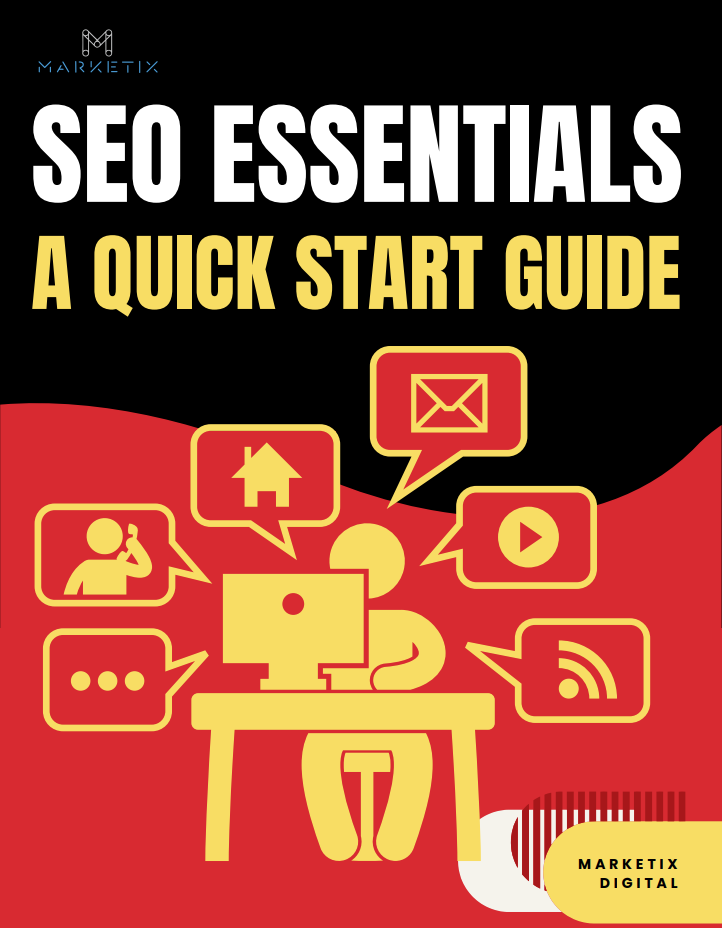- Home
- > The Marketix Blog
- > SEO
What Are Backlinks in SEO?

In search engine optimisation, there's a term that often comes up but isn't always clear to everyone: "backlinks."
Whether you're an experienced digital marketer or just starting out, backlinks play an important role in SEO, and they can be a bit of a puzzle.
In this comprehensive guide, we're here to help explain the secrets of backlinks in a way that is easy to understand.
We'll show you how important backlinks are and provide you with the knowledge you need to use them effectively in your own SEO strategy.

Understanding Backlinks
Backlinks are essential for guiding both people and search engines through websites, acting as connections between different web pages.
Imagine a popular industry news website linking to an article on your company's blog. This is like a vote of confidence, signalling to search engines that your content is valuable and worth exploring.
Quality is more important than quantity in backlinks; it's about gaining links from reputable and relevant sites. These high-quality backlinks enhance your website's credibility and can improve its position in search results.
They build trust with search engines and your audience, marking your site as a reliable information source in your industry. This not only attracts the right visitors but also strengthens your website's online visibility, crucial for business growth and customer engagement

Why Are Backlinks Important for SEO?
In SEO, backlinks are not just about getting your website to rank higher in search results. They're also key for bringing the right kind of visitors to your site.
For example, imagine a well-known business group in your industry links to your website. This is like a signpost, directing people who are already interested in your type of business right to you. These visitors are more likely to engage with your services or products, potentially increasing your sales. It's important to get these kinds of quality backlinks from respected sources related to your industry.
Such links act as recommendations, boosting your website's reputation and making it more trustworthy to both search engines and potential customers.

Benefits of Quality Backlinks
Quality backlinks are incredibly valuable in the world of SEO, offering several key benefits for your website. Think of them as boosting your website's reputation online. For example, when a respected industry blog or a well-known business directory links to your site, it's like a nod of approval to search engines, showing that your site is trustworthy and useful. This can improve your website's 'domain authority,' a kind of online reputation score.
Moreover, these backlinks bring in what we call 'organic traffic' – people who find and visit your site naturally. Imagine someone reading an article on a popular industry site and seeing a link to your website. They click on it and land directly on your site. This isn't just any visitor; it's someone genuinely interested in what you offer, making them more likely to engage with your content or even become a customer.
While backlinks are known for helping your site appear higher in search results, their ability to enhance your online reputation and drive targeted, interested visitors to your site is equally important. For any mid-market business, getting quality backlinks from relevant and respected sources can be a game-changer, as it not only increases your visibility but also attracts the right kind of audience to your brand

How Do Backlinks Work?
Understanding backlinks is a big advantage in SEO. Think of backlinks as bridges on the internet that connect one website to another. It's like having a network of roads that connect different businesses in a city. These connections are formed when one website mentions another and includes a link that people can click on.
Imagine clicking on a backlink as opening a door to another business's website. This makes it easier for people and search engines to find and explore new and interesting websites.
Search engines like Google view these links as signs of trust. When a respected website links to your site, it's similar to a well-known business in your community giving you a public thumbs-up. This endorsement is even more valuable when it comes from websites that are relevant to your business.
For example, if you run a mid-market tech company and a prominent technology blog links to your website, it's like getting a seal of approval from a respected player in your industry. This kind of high-quality backlink not only boosts your visibility but also tells search engines and potential customers that your website is a trusted source of information.
Backlinks are not just about connecting websites; they're about building trust and credibility in your online community, much like having good relationships with other businesses in your area.

Acquiring Quality Backlinks
Acquiring quality backlinks is a blend of skill and strategy, essential for showing that your website is relevant and trustworthy. Let's look at some straightforward ways to earn these valuable links:
1. Creating Exceptional Content: The first step is to produce outstanding content. This could be anything from comprehensive guides to engaging infographics. For instance, if you run a mid-market gardening supplies business, creating an in-depth guide on sustainable gardening techniques could attract backlinks from gardening blogs and eco-friendly websites.
2. Guest Blogging: Collaborate with other businesses by guest blogging. You write a valuable article for their blog, and they write for yours. It’s important that the content is relevant to their audience. This mutual exchange benefits both parties and can lead to backlinks.
3. Digital PR Campaigns: Use digital PR to get your content noticed by journalists and media outlets. This might involve crafting unique stories or insights about your industry. For example, if your business has recently adopted new eco-friendly practices, sharing this with media outlets could result in your story being featured and linked to.
4. Social Outreach and Influencer Collaboration: Partnering with influencers or content creators in your niche is another effective strategy. This collaboration could involve creating articles, videos, or podcasts that are then shared across various platforms, potentially attracting backlinks.

The Different Aspects of Backlinks
In SEO, backlinks are more complex than they first appear. Let's explore different types of backlinks:
Follow vs. Nofollow Links: What's the Difference?
You might have come across terms like 'follow' and 'nofollow' links. A 'follow' link is like a strong vote of confidence, passing trust and recognition from one website to another. It's similar to a public endorsement. On the other hand, 'nofollow' links don't transfer this trust. However, they're still useful as they direct traffic to your site and add variety to your link profile.
For instance, if a well-known industry magazine (like a leading business journal for mid-market companies) includes a 'follow' link to your website in an article, it significantly boosts your site's authority. A 'nofollow' link from a popular forum, while not enhancing authority, can still bring interested visitors to your site.
UGC and Editorially Placed Links: Their Importance
Backlinks can originate from different sources. Some are created by users themselves, like in forum discussions or blog comments, and are typically marked as 'rel=ugc' (user-generated content). Others are editorially placed by website owners who genuinely find your content valuable. Both types are appreciated by Google for their authenticity and contribute positively to your site's SEO.
Imagine your company launches an innovative product. A tech blogger might try it and share their experience in a blog post with a link to your product page (an editorially placed link), while a satisfied customer might mention your product in an online forum with a link (a UGC link). Both types of links bolster your website's reputation in different but valuable ways.
Common Backlink Attributes
Three important things to remember about backlinks:
1. Link Text or Anchor Text: This is the clickable part of a hyperlink. It's important because it helps search engines understand what the link is about. The anchor text should describe the linked content accurately.
2. Authority of the Linking Domain: Where the link comes from matters. Backlinks from trustworthy websites carry more weight.
3. Relevance of the Link: Backlinks work best when they come from websites related to your niche. Links from closely related sites have a more significant impact on SEO.
Link Schemes and Their Risks
Some ways of getting backlinks can be risky. It's important to know the dangers of certain link-building practices. Some practices, like buying or trading links, can harm your website's reputation. It's better to focus on earning high-quality links naturally. These practices can lead to Google penalties and even removal from search results. Common link schemes to avoid include buying links, participating in link farms, excessive reciprocal linking, and contributing low-quality guest posts.
Additionally, over-optimising anchor text, involving private blog networks (PBNs), leaving comment spam, and acquiring irrelevant or low-quality backlinks can all harm your website's credibility.
While backlinks are important, it's safer to build them in the right way to avoid problems and keep your website's reputation intact.

Measuring Backlink Success
Now that you know how to get good backlinks, it's just as important to check if they're helping your website. This means keeping an eye on a few important things.
First, there's something called 'Domain Rating (DR),' which is like a score that tells you how much search engines trust a website. The higher the score, the better. You also want to know how many different websites link to yours, which is called 'Referring Domains.' In our opinion, it's good to have lots of quality websites linking to you.
Another thing to check is the 'Quantity and Quality of Backlinks.'
This means looking at how many backlinks you have and where they're from. It's better to have a few good ones than lots of not-so-good ones. If your backlinks are doing well, you should see more people coming to your site from search engines, and your site should show up higher when people search for things related to it.
To make sure your backlinks are healthy, you can use 'Backlink Audit Tools' to check for any bad ones that could hurt your site. These tools look closely at your backlinks to see if they're good or not.
Conclusion
Backlinks are important for good SEO, helping to link up your website and boost how it's seen online. Getting great backlinks is about using smart strategies, careful planning, and keeping an eye on how things are going.
To improve your website's ranking in search results and become known as an expert in your area, it’s important to focus on creating valuable content and applying effective techniques. Always remember to follow the rules of good SEO practice, be patient, and aim for long-term success. SEO is always changing, so it's good to stay open to new ideas and methods.
Remember, your success in building quality backlinks is a significant step towards your overall success. Happy backlink building, and here's to your continued success in SEO!
Ready to Use Backlinks to Improve Your Website?
Contact Marketix Digital, a trusted Sydney SEO Agency and Google Ads Management Agency. We focus on SEO, PPC, and Google Ads, and we've helped many businesses in Australia. Let us help you boost your online presence, get more leads, and grow your business.
Get in touch with Marketix Digital today, and let's put backlinks to work for you. Your online success is just a call or message away!

Free Download SEO Book
Download our 24-page SEO book to learn:
- How SEO Really Works
- How to Rank #1
- Content & SEO
- Choosing an SEO Agency
Thank you!
You have successfully joined our subscriber list.






